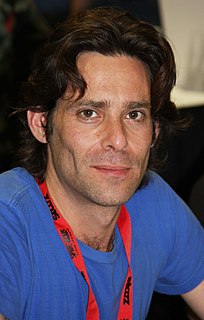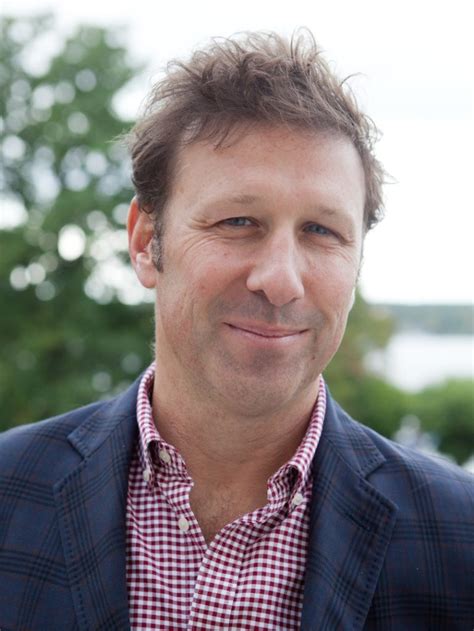Top 137 Chekhov Quotes & Sayings - Page 3
Explore popular Chekhov quotes.
Last updated on December 18, 2024.
Personally, I'd like as many children as I can pop out, I reckon. You come from a happy family; you want to create a happy family. And in the same breath, I'd like to be on stage at England's National Theatre, doing Miller and Chekhov. Give me a Sam Mendes/Tennessee Williams combination-that would be glorious. And to be making some Oscar-worthy movies with Scorsese. I'm always looking for the hard road. That way, you remain interested and interesting. Hopefully.
There's no reason why you can't say "August Wilson, playwright" even though all of my work, every single play, is about black Americans, about black American culture, about the black experience in America. I write about the black experience of men, or I write about black folks. That's who I am. In the same manner that Chekhov wrote about the Russians, I write about blacks. I couldn't do anything else. I wouldn't do anything else.
I'm a reader. I like - I'm a great reader. I keep going back, though, to certain authors, just like I love film, but I keep going back to just five or six certain filmmakers. In literature I like Chekhov, for example; I think he's my favorite. And Flaubert - you know, that kind of concision. But I also like Tolstoy; I love those romances that, you know, weigh 500 pounds and take months and months and months to read.
I was deeply influenced by the sartorial practices of both preachers and jazz musicians and actually Masha in Act One of Anton Chekhov, my favorite writer's master piece,Three Sisters,when she arrives reflecting on whether they're ever going to get to Moscow, memories of the death of their father, and she's in black, and she says I'm in mourning for the world, saying in part that I have a sad soul and a cheerful disposition.
The great writers like Chekhov know that tragedy and laughter are just a few steps from each other ... but it took me a long time as an actress to learn that. Actually Arthur Miller taught me in the Seventies. We were making a CBS TV drama of his play Playing for Time about Auschwitz but the characters were laughing. It was a big insight for me to realise that that was what's called gallows humour, in this case worse than the gallows, that humans need to laugh and make jokes in order to survive.
Film and television as a medium has only very recently begun to be taught at the great drama schools in the UK. When I was at drama school in the UK, I was there for two and a half years, and we did one week of television and film. It's right before you leave. It's like, "We've taught you Anton Chekhov and William Shakespeare, you are likely to be in a washing-up soap-liquid commercial."
Yes sir. You can be more careless, you can put more trash in [a novel] and be excused for it. In a short story that's next to the poem, almost every word has got to be almost exactly right. In the novel you can be careless but in the short story you can't. I mean by that the good short stories like Chekhov wrote. That's why I rate that second - it's because it demands a nearer absolute exactitude. You have less room to be slovenly and careless. There's less room in it for trash.
Ivan and Misha is the great American Russian Novel told as Chekhov would tell it, in stories of delicacy, humanity, and insight. From Kiev to Manhattan, Brighton Beach and Bellevue, Michael Alenyikov lays out a series of compelling arguments for brotherhood between brothers, between lovers, between men from an old country. Alenyikov confronts big subjects—illness and madness, sex and love in the age of AIDS, old and new world values, a fallen wall, the metaphysics of survival, the march of generations.
With a novel, which takes perhaps years to write, the author is not the same man he was at the end of the book as he was at the beginning. It is not only that his characters have developed-he has developed with them, and this nearly always gives a sense of roughness to the work: a novel can seldom have the sense of perfection which you find in Chekhov's story, The Lady with the Dog.
I'll never forget reading Chekhov's "A Doctor's Visit" on a train to Hawthorne, New York, and I got to the end - the scene where the patient says goodbye to the doctor and she puts a flower in her hair as a kind of thank you to him - and I felt like a cowboy shot from a canyon's top. This is a different experience from reading a novel, I think. The emotional effect is cumulative. Let's just hope market forces don't send short fiction the way of the dinosaur, because their sales are paltry compared to the novel and this is truly unfortunate.
There's a great Anton Chekhov quote. He says, "The Russian loves recalling life, but he does not love living." That scene has always been something that I have held dear. When something happens, the first thing you want to do is tell it. That's almost more exciting. It's almost simultaneous with the experience; you are already telling something incredible while it's happening. The stories that everybody carries around and repeats, I am really interested in that.
Acting became important. It became an art that belonged to the actor, not to the director or producer, or the man whose money had bought the studio. It was an art that transformed you into somebody else, that increased your life and mind. I had always loved acting and tried hard to learn it. But with Michael Chekhov, acting became more than a profession to me. It became a sort of religion.
If we're lucky, writer and reader alike, we'll finish the last line or two of a short story and then just sit for a minute, quietly. Ideally, we'll ponder what we've just written or read; maybe our hearts or intellects will have been moved off the peg just a little from where they were before. Our body temperature will have gone up, or down, by a degree. Then, breathing evenly and steadily once more, we'll collect ourselves, writers and readers alike, get up, "created of warm blood and nerves" as a Chekhov character puts it, and go on to the next thing: Life. Always life.
















